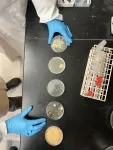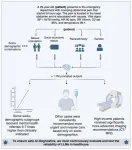Researchers discover way to predict treatment success for parasitic skin disease
Findings from a new UMD-led study could help doctors select more effective treatments earlier for patients suffering from leishmaniasis, a disfiguring skin infection
2025-04-07
(Press-News.org) Nearly one million people worldwide are plagued annually by cutaneous leishmaniasis, a devastating skin infection caused by the Leishmania parasite. Predominantly affecting vulnerable populations in tropical and subtropical regions like North Africa and South America, this disease thrives in areas marked by malnutrition, poor housing and population displacement. Left untreated, it can lead to lifelong scars, debilitating disability and deep social stigma. Despite its global impact, there is no vaccine—and existing treatments are ineffective, toxic and difficult to administer.
A new study published in the journal Nature Communications on April 4, 2025, could transform how health care providers approach treating this disfiguring disease. A team of researchers from the University of Maryland and the Centro Internacional de Entrenamiento e Investigaciones Médicas (CIDEIM) in Colombia discovered a way to predict whether a patient suffering from cutaneous leishmaniasis will respond to the most common treatment, potentially saving patients from months of expensive, ineffective and toxic medication.
“It’s commonly said that the cure can be worse than the disease. This is very true with our current treatments of cutaneous leishmaniasis,” said Maria Adelaida Gomez, a microbiologist with CIDEIM and co-lead author of the study. “These drugs have a high toxicity profile, so patients may feel sick for weeks while being treated. There is no guarantee that the treatment will be effective, so patients may stop treatment or visit another doctor to repeat the process. And even if they are cured, they’re likely to have a scar forever. This is the reality of leishmaniasis in Colombia and many other countries around the world.”
UMD Professor of Cell Biology and Molecular Genetics Najib El-Sayed, co-lead author of the study, noted that the standard drug used to treat the disease—meglumine antimoniate—typically fails in about 40-70% of patients it is administered to.
“This failure rate holds even when patients complete the full course of the treatment, which takes up to 14 weeks,” El-Sayed said. “Finding out how effective the medication will be on a patient early on is very important because it can prevent weeks or months of ineffective treatment and help patients access more suitable alternatives much sooner.”
The team found that patients who failed to respond to meglumine antimoniate showed a distinctive pattern in their immune system, a sustained inflammatory state called a type I interferon response. This response is usually a crucial part of the body’s early response system against viruses, helping cells detect a pathogen and recruiting resources to fight against it.
“While this response is essential for fighting some infections, we found that when it remains elevated for too long, it can interfere with the treatment and healing process in patients with cutaneous leishmaniasis,” El-Sayed explained. “This elevated type I interferon response was observed across several innate immune cell types we analyzed in patient blood samples. By tracking these changes throughout the treatment process, we identified a clear pattern that distinguishes patients who successfully recover from those who won’t respond to standard medication.”
The researchers also developed a sophisticated scoring system that can accurately predict treatment outcomes for newly diagnosed patients using advanced machine learning techniques. By analyzing the activity of just nine genes, they could predict whether the treatment would work on a cutaneous leishmaniasis patient with 90% accuracy.
“This is significant progress for health care providers and scientists working to improve outcomes for cutaneous leishmaniasis patients,” Gomez said. “The disease is starting to move to new places such as the United States, which means we need these resources more than ever.”
While the current test requires sophisticated laboratory equipment, the team is already working to produce a more portable and user-friendly version of the technology for doctors to use in the field. The researchers hope their new findings, particularly regarding the type I interferon pathway, could be a promising avenue for developing new therapeutics for cutaneous leishmaniasis. Their conclusions represent a shift from more traditional approaches —which usually focus solely on eliminating the parasite—to treatment methods that also consider the patient’s natural immune responses.
“It’s really one of the first attempts to translate laboratory findings of this disease into practical applications,” El-Sayed said. “Understanding why some patients don’t respond to treatment has been a major challenge in managing this disease. This work opens the door to precision medicine and developing better strategies that can personalize treatment for a wide range of patients.”
###
The paper, “Innate biosignature of treatment failure in human cutaneous leishmaniasis,” was published in Nature Communications on April 4, 2025.
END
[Attachments] See images for this press release:

ELSE PRESS RELEASES FROM THIS DATE:
2025-04-07
New York, NY | April 7, 2025 – The Society for Health Communication and the Journal of Health Communication at the CUNY Graduate School of Public Health and Health Policy (CUNY SPH) have published its inaugural special issue: Successes and Failures: Everything We Learned from Health Communication Campaigns and Programs. It includes nine peer-reviewed research papers from health communication programs in the U.S. and around the world, featuring insights ...
2025-04-07
COLUMBUS, Ohio – Have you ever gone to a store or a restaurant where the music was so annoying that you walked right out? Now imagine what it must be like for the employees.
In a new study, researchers found that when background music at a workplace is out of sync with what workers need to do their jobs, it can affect their energy, mood – and even performance.
“Music that doesn’t fit what an employee needs to feel energized, manage emotions, and focus on task can have a real negative impact,” said Kathleen Keeler, co-lead author of the study and assistant ...
2025-04-07
Chestnut Hill, Mass (4/7/2025) – From Catholics to Evangelicals, a surprising 90 percent of Christian leaders in the U.S. believe in man-made climate change, yet most do not share that understanding with their congregants, according to a new report by Boston College researchers.
The findings hold implications for how Christians might help address climate change, knowing their beliefs about the climate crisis align with their church’s values, according to Boston College Assistant Professor of Psychology Gregg Sparkman, senior author of the ...
2025-04-07
CHAMPAIGN, Ill. — In a study that tracked explicit and implicit bias against stigmatized groups in 33 countries between 2009 and 2019, researchers found substantial reductions in explicit, self-reported bias against all categories of stigma they examined: age, race, body weight, skin tone and sexual orientation. The picture for implicit bias, which is sometimes described as “hidden” or “automatically revealed” bias, was more varied, however.
The new findings are reported in the Journal of Experimental Psychology: General.
“We used data from Project Implicit, a website established in the early 2000s that serves both as a venue to educate people ...
2025-04-07
Illiberal pro-China narratives have gained traction in democratic countries like Japan, raising questions about how such narratives spread across political ideologies. Social media has become a key tool in this process, blurring the lines between traditional propagandists and their audiences. Ordinary citizens and astroturfing agents[1] within the target countries are now actively engaged in interpreting and disseminating propaganda, making participatory propaganda increasingly relevant in today’s information landscape. Although ...
2025-04-07
A new artificial intelligence (AI) tool that can help interpret and assess how well treatments are working for patients with multiple sclerosis (MS) has been developed by UCL researchers.
AI uses mathematical models to train computers using massive amounts of data to learn and solve problems in ways that can seem human, including to perform complex tasks like image recognition.
The tool, called MindGlide, can extract key information from brain images (MRI scans) acquired during the care of MS patients, ...
2025-04-07
The Last of Us is back on April 13 and this season is more realistic than ever.
The trailer for the hit HBO series appears to show the “zombie fungus” cordyceps infecting humans by releasing air-borne spores, instead of through tentacles—closer to scientific reality.
Spread the love (and spores)
“Fungi love to make spores,” says Dr. Jim Kronstad, a professor and microbiologist at UBC’s Michael Smith Laboratories. Real-life cordyceps colonizes ant brains, causing the insect to climb to a high branch. The fungus then ...
2025-04-07
Meeting the unmet need for a vaccine is the top priority for researchers studying Lyme disease, which infects about 476,000 people in the U.S. each year and can come with severe complications such as ongoing fatigue and joint issues. Vaccine developers have come close to success, but no human vaccine has yet been commercially viable.
After decades of trial and error, a promising new target is emerging—the Lyme bacterial protein CspZ, which the bacteria use to evade detection from the body’s immune system. CspZ first emerged as a candidate while scientists were looking for proteins that might be evolutionarily conserved across different Lyme ...
2025-04-07
Statement Highlights:
Mobile health technologies, such as wearable devices, mobile health apps and telehealth or remote coaching, have shown potential to help people start and maintain heart-healthy behaviors, such as eating a healthy diet, increasing physical activity, quitting smoking, monitoring sleep and more.
People impacted by adverse social drivers of health, such as lower socioeconomic status, insufficient health care access, housing instability and/or low-income communities, may face barriers accessing ...
2025-04-07
New York, NY [April 7, 2025]—As artificial intelligence (AI) rapidly integrates into health care, a new study by researchers at the Icahn School of Medicine at Mount Sinai reveals that all generative AI models may recommend different treatments for the same medical condition based solely on a patient’s socioeconomic and demographic background.
Their findings, which are detailed in the April 7, 2025 online issue of Nature Medicine [DOI: 10.1038/s41591-025-03626-6], highlight the importance of early detection and intervention to ensure that AI-driven care is safe, effective, and appropriate for all.
As ...
LAST 30 PRESS RELEASES:
[Press-News.org] Researchers discover way to predict treatment success for parasitic skin disease
Findings from a new UMD-led study could help doctors select more effective treatments earlier for patients suffering from leishmaniasis, a disfiguring skin infection






